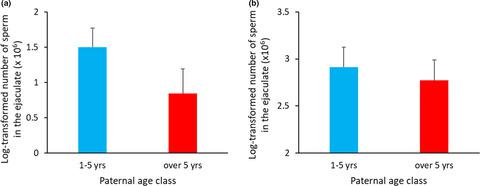当前位置:
X-MOL 学术
›
Ecol. Lett.
›
论文详情
Our official English website, www.x-mol.net, welcomes your
feedback! (Note: you will need to create a separate account there.)
Paternal age negatively affects sperm production of the progeny
Ecology Letters ( IF 7.6 ) Pub Date : 2021-02-10 , DOI: 10.1111/ele.13696 Pauline Vuarin 1, 2 , Loïc Lesobre 1 , Gwènaëlle Levêque 3 , Michel Saint Jalme 4 , Frédéric Lacroix 1 , Yves Hingrat 1 , Gabriele Sorci 2
Ecology Letters ( IF 7.6 ) Pub Date : 2021-02-10 , DOI: 10.1111/ele.13696 Pauline Vuarin 1, 2 , Loïc Lesobre 1 , Gwènaëlle Levêque 3 , Michel Saint Jalme 4 , Frédéric Lacroix 1 , Yves Hingrat 1 , Gabriele Sorci 2
Affiliation

|
Parental age has profound consequences for offspring’s phenotype. However, whether patrilineal age affects offspring sperm production remains unknown, despite the importance of sperm production for male reproductive success in species facing post‐copulatory sexual selection. Using a longitudinal dataset on ejaculate attributes of the houbara bustard, we showed that offspring sired by old fathers had different age‐dependent trajectories of sperm production compared to offspring sired by young fathers. Specifically, they produced less sperm (−48%) in their first year of life, and 14% less during their lifetime. Paternal age had the strongest effect, with weak evidence for grandpaternal or great grandpaternal age effects. These results show that paternal age can affect offspring reproductive success by reducing sperm production, establishing an intergenerational link between ageing and sexual selection.
中文翻译:

父本年龄对子代精子产生不利影响
父母的年龄对后代的表型具有深远的影响。然而,尽管精子生产对于面临交配后性选择的物种中的男性生殖成功至关重要,但父系年龄是否会影响后代精子生产尚不清楚。使用关于胡巴拉dataset的射精属性的纵向数据集,我们显示,与年轻父亲所生后代相比,年老父亲所生后代的精子生产轨迹不同。具体而言,他们在生命的第一年产生的精子较少(-48%),而在生命中则减少了14%。父亲年龄的影响最大,而祖父母年龄影响或巨大的祖父母年龄影响证据不足。这些结果表明,父本年龄可以通过减少精子产生来影响子代的生殖成功,
更新日期:2021-03-16
中文翻译:

父本年龄对子代精子产生不利影响
父母的年龄对后代的表型具有深远的影响。然而,尽管精子生产对于面临交配后性选择的物种中的男性生殖成功至关重要,但父系年龄是否会影响后代精子生产尚不清楚。使用关于胡巴拉dataset的射精属性的纵向数据集,我们显示,与年轻父亲所生后代相比,年老父亲所生后代的精子生产轨迹不同。具体而言,他们在生命的第一年产生的精子较少(-48%),而在生命中则减少了14%。父亲年龄的影响最大,而祖父母年龄影响或巨大的祖父母年龄影响证据不足。这些结果表明,父本年龄可以通过减少精子产生来影响子代的生殖成功,











































 京公网安备 11010802027423号
京公网安备 11010802027423号